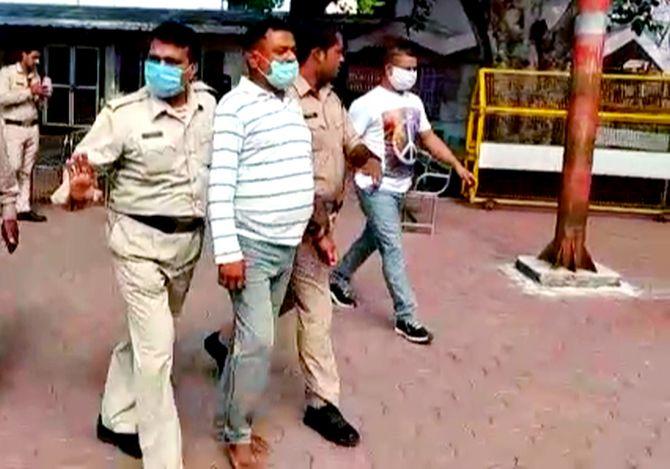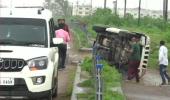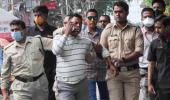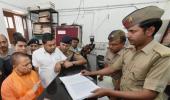'Not unlike politicians who gravitate towards whoever is in power, mafia dons too have a great survival streak, switching loyalty to the party in power,' observes Virendra Kapoor a week after gangster Vikas Dubey was slain in an alleged encounter.

Hours later, the Uttar Pradesh gangster was dead. The UP police claimed he was killed after he allegedly escaped from police custody. Photograph: ANI Photo
Thanks to the Vikas Dubey saga in UP, the coronavirus pandemic and the tension at the China border took a lower billing in the public mindscape.
But, rest assured, not for long.
Soon, the hand-wringing by a medley of public intellectuals and columnists over the cold-blooded killings -- which almost all encounter deaths anyway are with a rare exception or two -- would die down.
Both China and Corona will return to the front pages.
For, our attention span is notoriously fleeting.
If it wasn't, by now we would have drawn the right lessons from our beating in 1962 and equipped our armed forces to meet the challenge of the northern bully head-on.
Since we didn't, the Chinese flex their military muscle every now and then.
Of course, one has little doubt that Dubey was eliminated in cold blood.
As were at least five of his henchmen.
A few days earlier, all of them had signed their own death warrants, having committed the cardinal sin of killing eight policemen.
Momentarily, the ganglord slipped, forgetting that in his line of high-risk, high-income work, the police as accomplice is an asset but as an enemy it is big trouble.
Dubey wrote finis to his lucrative career in crime the moment he marshaled his troops to waylay the police party come to visit him in connection with the nth murder charge in his fortress-like den in the boondocks of Kanpur.
After that heinous act, nobody could have saved him.
The police failing to protect ordinary, peace-loving citizens from lawless elements is one thing.
But woe befall the country if the guardians of law and order themselves feel insecure, unable to protect themselves from those who are in some ways their own creation.
That would be a greater cause of concern than the mushroom growth of mafia dons in every nook and cranny of the nation.
Of course, extrajudicial killings have been there in every regime.
Where shall we begin? When the peasant revolt in Telangana in the late 1940s and early 1950s was put down by the newly independent country with a ruthless resort to police violence, including cold-blooded murder of activists?
Or the elimination of the menace of dacoits in the 1950s and 1960s through informally sanctioned killings by the police in Punjab, Madhya Pradesh and other States.
Do we recall how the Naxal trouble in West Bengal and the Khalistani agitation in Punjab was quelled?
From neutralising violent political campaigns through extra-legal means to patroniing mafia dons was a natural progression.
So long as the ruling party of the day did not fear competition it was picky in blessing criminals who helped delivering the most important goods at election time, that is bulk votes of the shanty towns and village clusters where their writ rather than that of the police was the law.
However when politics became competitive, and rival parties were made to fight for every vote, gangsters became far more formidable.
The mafia don-police-politician nexus came to thrive all over the country under intense political competition.
Not unlike politicians who gravitate towards whoever is in power, mafia dons too have a great survival streak, switching loyalty to the party in power.
It is a mutually beneficial arrangement.
A natural corollary of this phenomenon is the transformation of notorious dons as politicians.
In fact, a career in crime is the easiest route to becoming an MLA or an MP, or even a minister.
So many names come to mind, but let us list only a couple of them.
Phoolan Devi and Kuldip Sengar in UP. Shabbuddin in Bihar.

It is a travesty of justice that the police mandated to apprehend criminals is obliged to treat them with due deference upon their becoming politicians.
Every state has its share of criminals-turned-netas.
In the recent Delhi riots, the AAP legislator who incited violence roams free, while his followers bear the brunt of the police investigations.
Of course, without a flawed legal system, criminals and other outlaws would not have such an easy time.
Take the case of Dubey himself.
In 2001, he shot dead a BJP minister who in panic had rushed into a police station to dodge him.
The minister's bodyguards, the thana police, etc, were eyewitness to the murder.
The FIR duly recorded these facts. But a few years later, Dubey walked free.
Why, because the eyewitnesses, all on the state's payroll, turned hostile.
Why were the witnesses not charged with perjury and dismissed from service, or if they had retired, why were their benefits not withdrawn is the question.
Somehow, witnesses in all such cases do tend to turn rogue, reneging on their own eyewitness accounts.
As for the much-ballyhooed police reforms, the less said the better.
These have been mentioned for decades, several committees and commissions have offered their recommendations.
But the will to reform is lacking.
No politician wants to loosen his grip on the police. It is his power of postings and transfers which empowers him to bend the police to his will, licit and illicit.
Consider how the other day the Great Maratha Sharad Pawar took the trouble to call on Chief Minister Uddhav Thackeray at short notice -- all for the sake of postings of a few DCPs of the Mumbai Police.
Apparently, the NCP Home Minister Anil Deshmukh's order posting the DCPs was reversed by Thackeray.
The CM clearly wanted to patronise his own favourite cops in the financial capital of the country.
Clashing political patronage was on display, wasn't it?
Sensational crimes such as the chain of encounter killings leading to the don's own grisly end, at regular intervals help induce a sort of catharsis for the public-spirited.
But this serves little purpose.
After a few days we will be back to 'normal', that is, till another Dubey comes along.
For, without cleansing the Augean stables of politics reform of the criminal justice system will remain a pipe-dream.
Clean politics alone holds the key to a clean 'system.'
Feature Production: Aslam Hunani/Rediff.com









